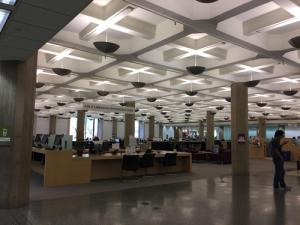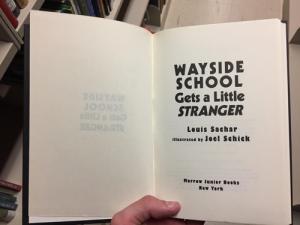Some people say that a university is only as good as its library, and the libraries at the University of Chicago seem to be very good. The Mansueto Library houses 3.5 million books, all stored underground and retrieved by robots. The Regenstein Library has the Special Collection of rare and unique books and records, 4.5 million print volumes, seven floors, and half a million square feet of floor space.
But does it have Wayside School Gets a Little Stranger?
I grew up in a household of books. As a kid, I was encouraged to read anything I could, and so I did, constantly and voraciously. I went to the library weekly, and would check out a stack of books, anything from Goosebumps to Great Expectations. My parents encouraged me to challenge myself with new books, styles, and ideas, and so nothing was off the table.
Except for Wayside School Gets a Little Stranger. My father banned it from the household and forbade me from reading it with a gravity and distain that frightened me a little bit. It was confusing; why was this book the one book ever written that I wasn’t allowed to read? I assumed my father must have been protecting me from something -- some dark, horrible, nightmarish hell-scape of a children’s novel that even he was barely able to survive.

I still haven’t read it, but I think I’m ready now. I’m going to check it out of the Regenstein Library.
Walking in the front doors, I am struck by how little the Regenstein Library resembles the public libraries of my youth. This is like a library wonderland. Rather than a large display of children’s novellas right in front of the entrance, I am greeted by the sight of an open study space, with a diverse selection of technological resources for students. There’s Ex-Libris, a student-run café, and an “Ask a Librarian” desk staffed by librarians prepared to help with research endeavors. I consider asking them for help with finding Wayside School Gets a Little Stranger, but part of me is worried that they, too, will tell me I’m not allowed to read it.
Because I’m looking for a book that may contain ancient and forbidden knowledge, I walk immediately to the Special Collections Research Center inside Regenstein. Special Collections houses an enormous amount of rare and unique books and texts, including manuscripts from Thomas Jefferson, George Washington, and one of the only extant letters Abraham Lincoln wrote to his wife. The people at the front desk tell me that they probably don’t have what I’m looking for. It’s astounding to me that a student can order a manuscript from the 5th century or an ancient parchment scroll, but not Wayside School Gets a Little Stranger. The book must be more dangerous than I ever could have imagined.
So I head upstairs. The upper levels of the library house the “bookstacks,” where the bulk of the books are stored. The upper levels are also “quiet zones,” with a greater expectation of quiet as you go up each floor. I’d need to be careful; if a single sentence of Wayside School Gets a Little Stranger is spoken aloud, as far as I know, I could get shushed, or worse... After half an hour of searching, I am able to find a Klingon translation of Hamlet, but not my white whale.
I’m getting desperate. Do I really want this? Is it worth it? What if this book changes me in ways I will never truly understand? But the curiosity is too powerful. I need this book. I can feel it calling to me. Guiding me. Beckoning. I close my eyes, visualize it, turn a corner and…

There it was. Right there on a shelf nestled away on the third floor. I pick it up with shaking hands, find a quiet corner, open it carefully, and begin reading.
It is a fairly normal book. It isn’t dangerous as much as it is whimsical and absurd, like any other book in the Wayside School series.
Chapter eight, however, seemed to question the existence of Santa Claus. I call my father immediately. “Is it true,” I asked. “Does Santa Claus not exist?”
He sighs and asks if I had finally read Wayside School Gets a Little Stranger. I begin to weep, the enormity of the revelation sweeping over me. He tells me that’s why he banned the book. That was the reason all along. He tried to protect me from the truth. He wanted to foster a love of learning, but not a love of learning the fact that Santa Claus isn’t real. Now I know for sure, and there’s no going back.
Libraries are the protectors of knowledge and of truth. Thanks to the Regenstein Library, I finally had access to knowledge that had always been forbidden to me. After having read Wayside School Gets a Little Stranger, I suppose I live a little more fully in the truth. That’s what the UChicago experience is all about, really. Our motto is “let knowledge grow from more to more, and so be human life enriched.” What that really means is that you should go out and read that book your parents never let you read as a kid. You could learn something new.